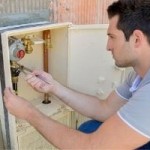The Right Way to Fix Foundation Leaks
Water leak damage is the number one cause of damage inside the home. Not only can it ruin electronics and other belongings, but it can also get expensive to repair if ignored. Most leaks go undetected for years before people notice a problem. By then, the damage could be extensive. When there is a leak under the foundation of a home, the damage can be even worse!
In this article, expert plumbers share information about the impact of foundation leaks and how they're found.
What is a Home Foundation Leak?
Foundation leaks occur when a pipe is damaged beneath the home, generally because of old age or construction damage. The soil around the foundation can swell with water, which applies extra pressure to the concrete foundation, causing it to crack and shift. Water then seeps through the cracks and causes extensive damage to the home.
The more water, the more damage, and all it takes is a small crack. With a faulty foundation, just a little rainfall could cause devastating property damage.
How do Plumbers Detect Concrete Foundation Leaks?
Leak detection for a foundation leak can be a challenge because all the damage occurs under the home. However, there is some evidence that can alert homeowners of a foundation leak.
- Wet floors
- The smell of mildew
- A higher than average water bill
- The sound of running water
- Raised flooring
- Wet carpet
These are all good reasons to call a professional. When a plumber comes out, he walks through the home to check for the indicators mentioned above, including visibly leaky pipes or water that wasn't shut off by the homeowner.
Then he determines the city's water pressure by gauging the pressure at the water hose after shutting off the water to the home. He will likely then document the pressure for the next test for leaks called the sewer-water test.
For the sewer test, the plumber uses a test ball that simulates a clogged drain. The plumber puts the test ball down the cleanout and fills the cleanout with water. The ball is inflated, simulating a clogged drain. If, after 15 minutes, the water level drops, a sewer leak is present.
For the water test, the plumber determines the city's water pressure by gauging the pressure at the hose bin. The plumber shuts off the water to the house, documents the city's water pressure, then waits 15 minutes to see if the pressure changes. If it does, a water line leak is present. When a leak is present, the next step is to locate and isolate the leak.
What tools Can Detect Leaks?
When a leak is present in the waterline, leak detection tools are key to finding the source. The main tools most plumbers use are:
- Electronically Amplified Equipment
- Electromagnetic Pipeline Locators
- Cameras
Detect Leaks Before It's Too Late!
Waiting to take the initial steps in fixing a leaky pipe while it's still manageable will ultimately result in adverse consequences. New flooring isn't cheap. Not to mention the amount of damage that would require new flooring in the first place. Compiling issues leads to much higher future expenses.
Water damage is a safety hazard in more ways than just breathing in harmful mildew. The pressure from the extra water pushing against the home's foundation causes the house to shift. The shifting could cause the doors and windows not to work correctly.
If the problem isn't resolved, the house's resale value will decrease. Every weather event involving rainfall could be one step closer to irreparable damage.
About City Plumbing
City Plumbing provides plumbing, heating, and air conditioning services to the greater Philadelphia area 24 hours a day, seven days a week. With more than 20 years of combined experience, City Plumbing is knowledgeable of their community's plumbing needs.













